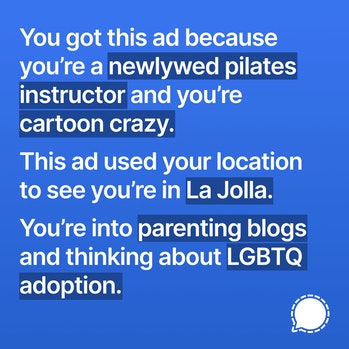Give the marketing folks at Signal a raise. The company says it recently tried to buy ads on Instagram revealing to users the personal information Facebook knows about them. Its advertising account was swiftly suspended.
Signal, which makes a popular encrypted messaging app, didn’t specify in its blog post whether Facebook provided an explanation for the ban.
Marketing genius — The social media company comes off badly whether the ads stayed up or not. If the ads were approved, users would have seen clearly the extent of personal information Facebook has on them. But being blocked looks even worse, like Facebook is trying to cover up its data collection practices.
It’s possible, probable even, that people would be fine exchanging some amount of data for free services like Instagram or Gmail. But Facebook has such a complex data collection apparatus that people are distrusting of it — fears that technology companies are listening in on people’s conversations exemplifies this concern. It’s hard to understand exactly what Facebook knows about you, or how to navigate its complex settings and control what it’s collecting.
“Companies like Facebook aren’t building technology for you, they’re building technology for your data,” Signal wrote. “They collect everything they can from FB, Instagram, and WhatsApp in order to sell visibility into people and their lives. This isn’t exactly a secret, but the full picture is hazy to most – dimly concealed within complex, opaquely-rendered systems and fine print designed to be scrolled past.”
Tracking — It’s not unfounded to be worried either. Facebook and other advertising-centric companies have spent years perfecting their tracking technology to the point that it’s highly sophisticated. Target once figured out a teen girl was pregnant before she knew, for instance, and Facebook has marked people as gay before they told anyone.
Facebook’s data collection practices recently came under fire by Apple, which released an update to iOS that makes tracking more difficult. Many apps and websites contain trackers that feed data back to Facebook so that it can learn more about a person — that they like sketch comedy, or just had baby — and figure out whether or not its ads are effective. iOS 14.5 requires developers ask permission to track a user. It’s unclear how much Facebook might be affected by the change, but it brings in tens of billions each quarter and we suspect it will survive.
CEO Mark Zuckerberg has argued that tracking allows Facebook to offer free services to a global audience, whereas Apple only gives secure products like iMessage to people who can afford an expensive iPhone. It’s indeed a bit self-serving for Apple since it makes most of its money selling phones, but it’s not wrong that Facebook deceives people into giving up more about themselves than they’d knowingly consent to, and then treats the data with a lack of care. Facebook’s existence has been defined by a dearth of forethought into how its products might be used for ill. Like how the Trump campaign tried using Facebook ads to discourage Black people from voting, or you know, the way the entire News Feed algorithm promotes extremism.
Signal saw a huge boost in downloads earlier this year after Facebook-owned WhatsApp said it would begin sharing more information with Big Blue.







